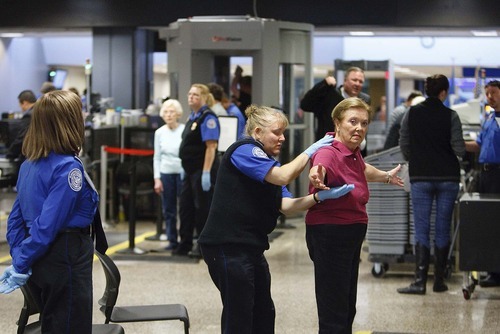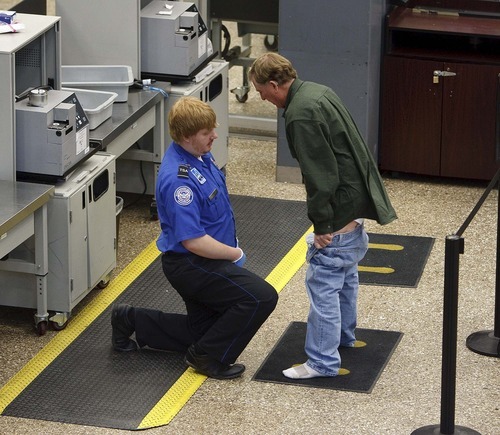This is an archived article that was published on sltrib.com in 2010, and information in the article may be outdated. It is provided only for personal research purposes and may not be reprinted.
The man standing in front of a Transportation Security Administration agent at the Salt Lake City International Airport for an enhanced pat-down Tuesday morning dropped his pants to just above his knees.
Enhanced security — a result of the recent targeting of cargo planes coming from Yemen and last year's Christmas Day underwear bomber — has been the buzz of the nation during the past week, especially enhanced pat-downs that cause many to question whether individual rights are being violated.
The man who dropped his pants refused to discuss his screening afterward as he raced to catch a flight. According to TSA Northwest Region spokesman Dwayne Baird, less than 3 percent of air travelers are selected for enhanced pat-downs. He said agents would never ask a person to disrobe in public like the man did — and certainly without added law enforcement on hand. It appeared as though the agent was surprised when the man unbuttoned his trousers.
Most travelers seemed to take it in stride Tuesday.
"I've got metal in my body, so I get patted down every time," said Sally Keller, of Smithfield. "It's a little more intense than before. If it saves one airplane full of people, I don't mind. But I am a 60-year-old grandmother and don't feel like a terrorist."
University of Utah law professor Amos Guiora, who was the legal adviser to a congressional task force working on a homeland-security strategy, said the screenings and pat-downs are legal.
But he wonders about their effectiveness.
"Why do we need to touch women's breasts or male genitalia?" he asked. "What are we looking for? I am not offended by the invasiveness of the body scan, but the question is to what end? ... Does the policy make for more effective homeland security? I'm not convinced."
Rep. Jason Chaffetz, R-Utah, a frequent TSA screening critic, said he has received a number of calls and e-mails from citizens who don't understand what their rights are and what they can and can't do when going through security.
The bottom line is that, in order to fly, some will either get the enhanced pat-down, go through the body-scanning machine or not fly.
"We have to learn to be more effective and less invasive," he said. "We shouldn't settle for anything less. There has to be a better, smarter way to do this that won't violate people's individual rights."
Chaffetz wonders if bomb-sniffing dogs might be more effective.
Guiora said an Israeli model based on sophisticated intelligence-gathering, interviews and the study of nonverbal behavior might be more effective, or at least worth a pilot project study.
Karen McCreary, executive director of the American Civil Liberties Union in Utah, said her organization has spoken out against the body scanners and these types of searches nationally due to privacy concerns and limited effectiveness.
"It's good to have the best security possible, but without intruding [on] the privacy of innocent travelers," she said. "There are a lot of folks who don't think they are effective. It's not clear that they would have detected the Christmas Day explosive."
Security lines during Tuesday's busy travel day at Salt Lake City International Airport were short and quick due to heavy staffing.
Utah resident Thayre Dennis, a frequent traveler who expects extra screening because of her artificial knee, appreciated the courtesy of the TSA agent who searched her. But it was different.
"She was really nice and told me everything she was doing," Dennis said. "I want to be cooperative and appreciate what they do. But I feel like the heavy pat-down was excessive beyond what I have previously experienced."
In a conference call Tuesday, TSA Administrator John Pistole said his agency has screened more than 35 million people using the enhanced procedures and has received 2,000 complaints.
He said the agency was concerned that Wednesday's loosely organized "opt out" day, when passengers deciding not to submit themselves to pat-downs or advanced imaging technology machines, might slow up the process.
Without specifically addressing the incident at Salt Lake City International Airport earlier this week, where a father took a youngster's shirt off for screening, Pistole said that, under an order given last week, children under age 12 would receive a modified, less-intrusive pat-down if selected for secondary screening.
Meanwhile, travel agents such as Toby Nash, of Salt Lake City's Cruise & Travel Masters are warning clients that air travel can be trying.
"We preface every vacation we sell by telling people to wear their easiest-going expression, to expect to be rough and rugged and to be sure to laugh at everything that comes your way."
Thomas Burr contributedto this report —
Holiday travel
The TSA recommends travelers allow at least 90 minutes and probably more before a domestic flight on the holidays to clear security prior to flight. It recommends 2½ to three hours when flying internationally. Travelers can log on to http://www.TSA.gov more about the security process.





